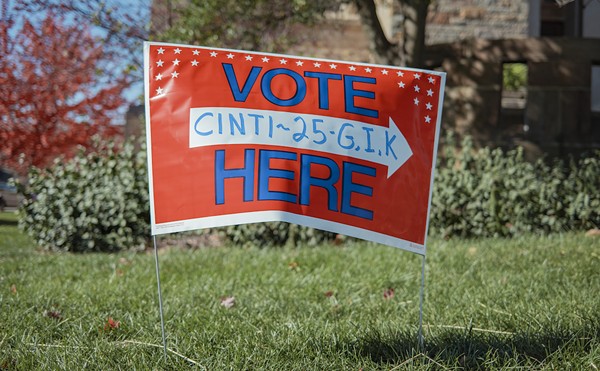Tourism Industry on Parade
Insiders say Mike Wilson's job is on the line at the Greater Cincinnati Convention and Visitors Bureau, where he is president. Critics say Wilson, eager to push for expansion of the Albert B. Sabin Convention Center, has been less than aggressive in pursuing mid-sized conventions, the better to make the case that expansion is needed because business isn't as good as it should be.
No one told the International Association of Official Human Rights Agencies (IAOHR) about Issue 3, the charter amendment that distinguishes Cincinnati as the only U.S. city to officially discriminate against gays and lesbians. IAOHR didn't know about Issue 3 until it had scheduled its conference for the Westin Hotel July 22-26, according to Doreen Cudnik, executive director of Stonewall Cincinnati. "They were devastated to hear this information," Cudnik says. "In lieu of moving it, they're going to make this issue part of their conference."
At least a fetish club got it right, scheduling its meeting outside the city limits. The Ohio Leather Summit will meet March 10 at the Quality Central Hotel and Suites in Norwood to discuss the legal implications of bondage, discipline and sadomasochism.
Local People Doing Stuff
Everyone on Cincinnati City Council supports campaign finance reform — until you get to the part about donors disclosing their employers or occupations. Then Charlie Winburn, Minette Cooper, Alicia Reece and Paul Booth object.
Making campaign donors disclose their employment would make donors "nervous," says Winburn. It would take too much time to look up information for contributors who don't disclose, says Cooper. It could lead employers to intimidate employees who support candidates the employer doesn't like, says Reece.
Councilman John Cranley, injecting a dose of sanity into the debate, notes that federal and state laws already require the information as a way to keep employers from using workers as donors, effectively skirting individual contribution limits.
Two more people arrested during protests against the TransAtlantic Business Dialogue have been exonerated. A jury last week acquitted Jacob Blickenov, who was charged with disorderly conduct. Charges against Blickenov's father, John Blinkenstaff, didn't even make it to trial; they were dismissed Jan. 18.
A second federal civil-rights lawsuit is now in the works, filed last week by Caleb Bennett. Cincinnati Police had charged Bennett with assault on a police horse, but prosecutors dismissed the charge. A widely distributed videotape shows Bennett didn't touch the horse. Attorney Robert Newman is handling both lawsuits, which name police officers as defendants.
The Sierra Club hopes to block a proposed highway and four-lane bridge over the Little Miami River, connecting Interstate 71 at Red Bank Road with I-275 . Glen Brand, head of the club's Cincinnati chapter, would rather see the money spent on commuter rail and an expanded bus system instead of a road through mostly rural land.
But Brand's real goal is to reform the 1960s methods that traffic engineers use to justify roads. Instead of easing projected traffic woes, new roads can create congestion by attracting new development, an effect called "induced traffic."
Brand's word carries weight. Last year a Sierra Club-backed campaign led the state to give a low grade to a $20 million highway interchange on Interstate 75 near Kyles Station Road in Monroe. Developers needed the interchange to lure a large mall, but the project is on ice for now.
Cincinnati attorney Rasheed Simmonds is back from South Africa, where he addressed the international conference of the Third World Legal Studies Association. His theme was "The Internet as a Revolutionary Tool for Developing Nations."
Porkopolis TIP LINES: 513-665-4700 (ext. 23) or [email protected]





